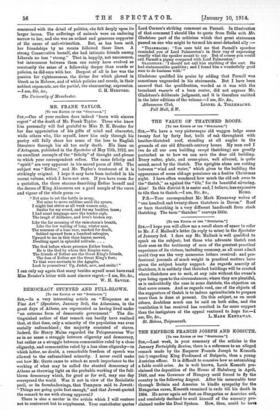DEMOCRACY STUNTED AND FULL-BLOWN. [To TEE EDITOS or TIM n ErECTATOL”I
Eint,—In a very interesting article on "Eloquence as a Fine Art" (Spectator, January 3rd), the Athenians, in the great days of Athens, are represented as having lived under "an extreme form of democratic government." The dis- tinguished author of that remark can hardly have realized that, at that time, only a minority of the population was even socially enfranchised ; the majority consisted of slaves. Indeed, Sir Henry Maine regarded the Peloponnesian War as in no sense a straggle between oligarchy and democracy, but rather as a struggle between communities ruled by a close oligarchy, and communities ruled by a less close oligarchy—in which latter, no doubt, a remarkable freedom of speech was allowed to the enfranchised minority. I never could make out how Mr. Grote came to attach so much importance to the working of what may be called the stunted democracy of Athens as throwing light on the probable working of the fall- blown democracy which, for good or for evil, may one day overspread the world. Was it not in view of the Socialistic peril, or its foreshadowings, that Tennyson said to Jowett „Things are going quite fast enough," and that Jewett quoted the remark to me with strong approval P
There is also a matter in the article which I will venture not to controvert but to supplement. Your contributor quotes
Lord Curzon's striking comment on Parnell. In illustration of that comment I should like to quote from Talks with Mr. Gladstone part of the criticism which that great statesman passed on one who might be termed his semi-detached ally TOLLENACHZ r ' You once told me that Parnell's speeches reminded you of Lord Palmerston's in their way of expressing exactly what the speaker meant to say. But of course you would call Parnell a pigmy compared with Lord Palmerston? GLADSTONE: I should not call him anything of the sort. He had statesmanlike qualities ; and I found him a wonderfully good man to do business with."
Gladstone qualified hie praise by adding that Parnell was sometimes unguarded in his statements. But I have been assured that the qualification, worded as it was with the trenchant srappaato of a born orator, did not express Mr. Gladstone's deliberate judgment, and it is therefore omitted in the later editions of the volume.—I am, Sir, &o.,






































 Previous page
Previous page